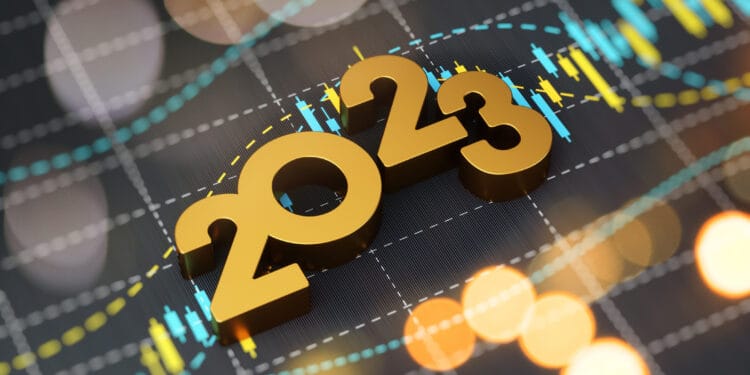- The Steep Tech Fall Hit Us All
- 2022’s Bloodbath – Amazon (NASDAQ: AMZN), Facebook/ META (NASDAQ: META), and Netflix (NASDAQ: NFLX)
- 2022’s Big Tech Survivors, even Thrivers: Apple (NASDAQ: AAPL) and Microsoft (NASDAQ: MSFT)
- First 2023 Trend – Rapid Course Correction
- Second 2023 Trend – The Advertising Game
- Conclusion: Risks and Rewards
FAANG is dead. A better acronym is now MAAAN – Microsoft, Apple, Amazon, Alphabet, and Netflix – as in ‘MAAAN, I wish I wasn’t invested in Big Tech stocks.’
Yet, for many of us, that isn’t much of an option. They’re terribly difficult to get away from.
Add in a couple of other big names that weren’t included back when FAANG was coined as a term – Microsoft, and Tesla – and our exposure to Big Tech is clear.
Let’s take a look at what’s going on, along with the implications of the recent industry-wide layoffs and some major trends to watch next year.
The Steep Tech Fall Hit Us All
Back in the summer of 2021, near the height of Big Tech’s pandemic market dominance, I took a look at my passive holdings and didn’t like what it showed.
I was overweight on Big Tech stocks. I’m betting a lot of investors still are. Even after some big shifts in my holdings, it was still more than I’d preferred.
At the time, between an S&P 500 and a mid+ cap tech fund, my exposure to large tech companies was approaching 50%.
It was all due to market capitalization weighting in the funds, where holdings in the funds were based on the underlying indices themselves. They were dominated by trillion-dollar companies.
Even after a brutal fall in share prices, market cap weighting still heavily favors Big Tech in S&P 500 ETFs, such as the SPDR S&P 500 ETF Trust (NYSEARCA: SPY), even though some Big Tech stocks have seen huge share price drops:
Keep in mind this is after huge share price drops, ones that tore Netflix from the top ten and decimated some of the Big Tech names out there:
Still, any investment in the SPDR S&P 500 ETF Trust (NYSEARCA: SPY) comes with a nearly 20% exposure from just the top 10 holdings. Overall holdings work out to over 26% (on this article's publish date).
In a practical sense, this means that the major market indices will continue to be tied to Big Tech, for better or worse.
Many signs point to a rough 2023, so we may be stuck with the former for the foreseeable future.
2022’s Bloodbath – Amazon (NASDAQ: AMZN), Facebook & Meta (NASDAQ: META), and Netflix (NASDAQ: NFLX)
Facebook, Apple, Amazon, Netflix, and Google. All have seen share prices pull back from all-time highs. The darlings of the tech boom in the 2010s have had to mature. But not all have.
The three Big Tech companies stand out as ones that will continue to struggle. I have little doubt they will struggle going forward as well for various reasons, but they have one thing in common: all are seeing massive losses, across the board, in key growth targets, or both.
Amazon (NASDAQ: AMZN), Facebook/ META (NASDAQ: META), and Netflix (NASDAQ: NFLX) have rarely seen such negative investor sentiment as the stock comparison chart above shows.
It’s easy to see why…
What used to be their key drivers of growth are becoming stagnant or massive money sinks.
Amazon
Amazon has lost a trillion dollars in market value. It posted a $2.5 billion loss in the third quarter of 2021 alone, year-over-year.
Plus, its Alexa division is on pace to lose about $10 billion alone in all of 2021. The division was practically gutted in the recent round of layoffs that may total over 10,000 workers.
Amazon Prime Video is another cash sink for the company, so much so that the CEO has hinted it may become a “standalone business” while the shipping and online ordering business is being pinched by inflation and high energy costs.
Meta
Over at Meta, the big push in the “Metaverse” is a spectacular flop as user growth continues to pull back. Between 2019 and 2022, the company invested $36 billion into Reality Labs. Over the same period, the division lost nearly $31 billion.
Plus, Meta itself says the company is going to lose about $10 billion in advertising revenue this year, for which it largely blames Apple’s privacy and advertising rule changes (more on those later).
Meta is laying off more than 11,000 employees, or 13% of staff.
Alphabet (Google)
Over at Alphabet or Google, pick a name, another 10,000 workers are getting the axe while its bread and butter revenue source, advertising, dramatically slowed.
This advertising hit, a core source of revenue for both companies, is seen as the beginning of a year of great uncertainty and continued spending cuts by companies worldwide as the threat of recession looms.
And if you’re wondering about Amazon and ad revenue, it is rapidly becoming an advertising business. In 2021 it generated $31.2 billion in ad revenue.
I’ll refer you to an illuminating article by Geoffrey A. Fowler over at The Washington Post, who breaks down exactly how dominant Amazon advertising is in search results.
He also goes into how Google has sacrificed what made it dominant – good search engine results – to bolster its ad revenue to the point where it compromises the entire system.
Netflix
Meanwhile, over at Netflix, the big-name, big-budget spending global spending spree for new content is over as subscriber growth has faltered.
It is taking an ‘across the board’ approach by paring back its real estate footprint, cloud computing costs, and layoffs – though they are far tamer at 450 people and counting.
Of note, Amazon Prime Video is paying a lot for video content and increased monthly cost for its bundled services – which is really what Amazon Prime is across shipping, video streaming, and music streaming – by about 16% for US subscribers earlier this year.
Though, if you’re keeping track, virtually all streaming platforms have raised prices this year. It’s kind of like how airline price hikes and fees have worked for years. Once one takes the plunge, the rest tend to follow.
2022’s Big Tech Survivors and Thrivers: Apple (NASDAQ: AAPL) and Microsoft (NASDAQ: MSFT)
It’s not all bad news for Big Tech companies if you look at the chart above. Apple (NASDAQ: AAPL) and Microsoft (NASDAQ: MSFT) are keeping pace with the broader investment climate, as represented by the SPDR S&P 500 ETF Trust (NYSEARCA: SPY).
So what’s the difference?
Microsoft’s core business is very different from the high-flying growth stocks that used monthly average users as a key metric for stock growth in years past.
The company’s core business model is built around its operating system, cloud computing, and cybersecurity.
Its operating expenses have increased considerably, marked by a 14% jump, year-over-year, in its fourth quarter fiscal year. Yet its acquisitions and investments are outpacing the increases – specifically in its Intelligent Cloud and Azure, which was up 40% year-over-year.
Microsoft, in this sense, has been the antithesis of other big-name, Big Tech companies. Its investments have actually generated additional revenue and profit. Quarterly net profit is up just 1%, but total net profit for the fiscal year is up 19%.
It is also adding to its pile of cash. It’s sitting on $105 billion after a string of cybersecurity acquisitions and cloud computing investments. According to its earnings call, the security business is up 40% year-over-year.
Growth, cash, and profits are what keep it on par with the broader market as other Big Tech companies tank.
Looking at Apple, it is still beating Wall Street analyst sales and income projections. Its latest quarterly results showed a sales gain of 8% year-over-year with a slight 1% profits gain.
Its products grew 9%, which was an expected decline in growth rate. Growth was also muted in its services segment, which includes Apple TV+ and Apple Music at 5% year-over-year, again expected.
What makes Apple particularly interesting is advertising. We'll get to it shortly…
First 2023 Trend – Rapid Course Correction
Most of what Big Tech, as a whole, needs to do is plain as day. They need to cut costs. They must adapt to slower growth, even negative growth in some business segments.
Most importantly, they must prove they’re capable of doing both quickly and efficiently.
That third one may seem redundant, but these are large companies. Ones that have seen many years of growth. It’s not clear that they have the institutional knowledge to transition to a period of fiscal discipline, let alone identify smart cuts that support meaningful growth.
It’s one thing to cut costs. But a far different thing to do it in a way that still leaves a clear path to meaningful recovery. Some companies may languish, waiting for better days ahead that may never come instead of pushing through.
It’s the old “baby with the bath water” problem, to put it in a very simple, idiomatic way.
Plus, it's a problem for anyone tasked to do it. I’ll put it this way, it’s a lot harder to impress people by what didn’t happen than by what did.
Imagine going into an employee review and saying, “I was in charge of a division that lost less money this time around, and at least you didn’t hire the guy over at company XYZ.”
Then imagine it in a stock market where tech companies suffer greater losses than the broader market because they’re built for growth instead of cash flow.
It’s a brutal game and one that is further handicapped by the seemingly ever-present risk of recession next year. I do not envy anyone or any company in a position where the results of such a transition may take several quarters to materialize.
Second 2023 Trend – The Advertising Game
One of the biggest emerging trends is one that started over the last several years. The advertising and marketing game has changed.
We talked about how that has changed quite a bit for Amazon and Google, at least for what consumers see.
However, a much bigger shift is happening behind the scenes. In short, Apple is pulling the rug out from under other Big Tech companies.
Apple's changes have been subtle but profound in privacy, marketing, and advertising standards.
First up, let's get the most obvious out of the way – specific “opt-in” requirements for cookies. It supported changes to privacy rules for transparency for what users were downloading alongside the content they chose to pursue.
This is especially applicable to third-party cookies – tracking tools that weren’t disclosed that came from companies or websites the user didn’t even visit.
A bit more obscure is the end of IDFA. Apple created it many years ago, kind of its version of a cookie, to identify unique mobile device IDs. Even if you clicked on something that identified you, apps you installed later could access the data. Then Apple killed it.
When combined and compared to big data tracking information, this data allowed companies to track the movement of specific users and monetize it. It got so bad that police agencies were buying the same data on the open market and suppressing its use in court proceedings.
Then there was one last big change: Apple decided to make a change to the emails its devices accessed. Anything sent to an Apple email address was immediately marked as ‘read.’ This may not seem like much, but it made email advertising campaigns, now overwhelmingly accessed by mobile devices, useless in many ways.
If marketers don’t know who decided to open an email with a certain subject line, they don’t know who could have clicked on any ads or links within them, and they no longer have any capacity to target ads going forward.
All of this was seen as a gain for internet privacy. But it has another effect. Apple effectively decided to keep all of this marketing information for itself and not share it with companies like Facebook and Google.
It even built a tool for advertisers, SKAdnetwork, for which it certainly will retain an early advantage as its competitors will need to react to any further changes without proprietary information.
Apple is effectively keeping all of this very valuable data for itself. Apple ad revenue has grown tenfold to $31 billion in 2021. It sells plenty of devices yet is fighting ‘tooth and nail’ against lawsuits challenging its 30% fee for all App Store transactions.
At the same time, and in shorter form, since it makes more sense, Amazon – as clearly shown in the link to the article from The Washington Post above, is going all in on monetization of its in-house advertising revenue for shopping search results.
This is an emerging trend that may ultimately define the fates of these businesses. This is an advertising war, plain and simple. For some of these companies, it may be an existential threat.
This trend will continue, and it may define the winners and losers in Big Tech as early as next year as investors continue to demand avenues of growth.
Conclusion: Risks and Rewards
2022 was a rough year for Big Tech, and it was largely anticipated after several years of stock value gains.
2023 may be worse, marking a year of stagnation, a downward spiral of layoffs and revenue drops, and the constant threat of recession.
But all these companies are not equal. They all have their unique challenges, but the goal is the same. Cut costs, and return to growth in critical business metrics prove their worth compared to sky-high valuations and peers.
The first couple of quarters of 2023 may be a lost cause. But investors will turn back to companies that can correct their course and instill confidence in management.
With clear advantages and a track record of protecting their cash flow, companies like Microsoft (NASDAQ: MSFT) and Apple (NASDAQ: AAPL) will be rewarded by investors.
And don’t sleep on an Amazon (NASDAQ: AMZN) rebound that may be substantial if its expanding advertising monetization of search results is combined with lower oil costs, tamed inflation, and lesser recession risks that threaten consumer spending.
Big Tech will not have a good year on the whole, especially early on. It’ll be a time to establish multi-year plans that don’t involve multi-year reorganizations.
If these companies can do so and weather more volatility and stock market drops, they’ll show outsized gains in 2024.
Take care,

Adam English
The Profit Sector













